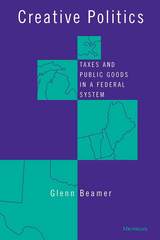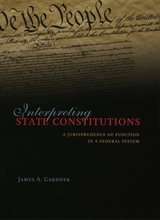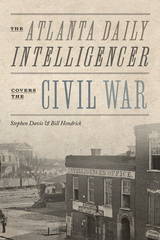2 books about Federal System

Creative Politics
Taxes and Public Goods in a Federal System
Glenn Beamer
University of Michigan Press, 2000
State legislators are constantly making tradeoffs between changing taxes and providing public services. Not only must they reconcile their own policy preferences with the preferences of their constituents, but they must consider the impact of actions taken by both the federal government and competing states. Glenn Beamer uses a series of in-depth case studies in eleven states to show how legislators made decisions dealing with taxation, economic development, education financing, and Medicaid.
Beamer identifies six factors that influence legislators' decisions: accountability, dependability, equity, obscurability, and horizontal and vertical transferability. Within the context created by citizen demands, intergovernmental politics, policy histories, court interventions, and state constitutions, this study analyzes how legislators employ these principles to develop and enact policies.
In addition to modeling state politics within the context of federalism, Creative Politics, reflecting the author's extensive interviews with legislators, is novel in its focus on politicians' views about public services, the strategies to finance them, and efforts to develop and maintain political support for them.
This book will be of interest to students and scholars of political science, economics, and public administration, and, more specifically, of federalism, state politics and policy, and legislative decision-making.
Glenn Beamer is Robert Wood Johnson Scholar in Health Policy Research, University of California, Berkeley, and Assistant Professor of Government, University of Virginia.
Beamer identifies six factors that influence legislators' decisions: accountability, dependability, equity, obscurability, and horizontal and vertical transferability. Within the context created by citizen demands, intergovernmental politics, policy histories, court interventions, and state constitutions, this study analyzes how legislators employ these principles to develop and enact policies.
In addition to modeling state politics within the context of federalism, Creative Politics, reflecting the author's extensive interviews with legislators, is novel in its focus on politicians' views about public services, the strategies to finance them, and efforts to develop and maintain political support for them.
This book will be of interest to students and scholars of political science, economics, and public administration, and, more specifically, of federalism, state politics and policy, and legislative decision-making.
Glenn Beamer is Robert Wood Johnson Scholar in Health Policy Research, University of California, Berkeley, and Assistant Professor of Government, University of Virginia.
[more]

Interpreting State Constitutions
A Jurisprudence of Function in a Federal System
James A. Gardner
University of Chicago Press, 2005
Interpreting State Constitutions examines and proposes a solution to a problem central to contemporary debates over the enforcement of civil liberties: how courts, government officials, and lawyers should go about interpreting the constitutions of the American states.
With the Supreme Court's retreat from the aggressive protection of individual rights, state courts have begun to interpret state constitutions to provide broader protection of liberties. This development has reversed the polarity of constitutional politics, as liberals advocate unimpeded state power while conservatives lobby for state subordination to a constitutional law controlled centrally by the Supreme Court.
James A. Gardner here lays out the first fully developed theory of subnational constitutional interpretation. He argues that states are integral components of a national system of overlapping and mutually checking authority and that the purpose of this system is to protect liberty and defend against federal domination. The resulting account provides valuable prescriptive advice to state courts, showing them how to fulfill their responsibilities to the federal system in a way that strengthens American constitutional discourse.
With the Supreme Court's retreat from the aggressive protection of individual rights, state courts have begun to interpret state constitutions to provide broader protection of liberties. This development has reversed the polarity of constitutional politics, as liberals advocate unimpeded state power while conservatives lobby for state subordination to a constitutional law controlled centrally by the Supreme Court.
James A. Gardner here lays out the first fully developed theory of subnational constitutional interpretation. He argues that states are integral components of a national system of overlapping and mutually checking authority and that the purpose of this system is to protect liberty and defend against federal domination. The resulting account provides valuable prescriptive advice to state courts, showing them how to fulfill their responsibilities to the federal system in a way that strengthens American constitutional discourse.
[more]
READERS
Browse our collection.
PUBLISHERS
See BiblioVault's publisher services.
STUDENT SERVICES
Files for college accessibility offices.
UChicago Accessibility Resources
home | accessibility | search | about | contact us
BiblioVault ® 2001 - 2024
The University of Chicago Press









